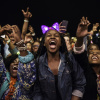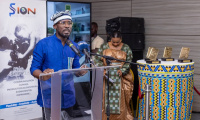Gambian musicians urged to return to traditional instruments
The Gambian National Centre for Arts and Culture (NCAC) has certified 13 musicians upon the completion of a recent three-day workshop on traditional music in the coastal suburb Fajara. The workshop was a call to young musicians to take up the country's traditional instruments.
 A group playing the kora, one of Gambia's traditional instruments. Photo: Africablogs
A group playing the kora, one of Gambia's traditional instruments. Photo: Africablogs
At the ceremony marking the close of the workshop, Hassoum Ceesay, Director of Cultural Heritage at the NCAC, noted that the sessions involved educating and encouraging younger musical artists to use traditional instruments in their compositions. “The objective is to have distinctive Gambian music which will be like a signature for the country's music,” he said. “If anybody comes across it, the person will immediately conclude that this is a Gambian music.”
While the Gambia has produced successful musicians, noted Ceesay, they have been more influenced by the western style and use western instruments as well. And even so some acts have complained that Gambians don’t have faith in local music.
While the workshop made no mention of that issue, success would be considered reached if a number of recording artists, especially participants at the NCAC workshop, return to the traditional instruments of the Gambia.
“They have been corporative and keen in learning,” he said of the chosen 13. “The training has been very fraternal and I am very impressed. Musicians are the best kind of people and easy to deal with. This training is very important because it helps the musicians to make further research in their music from the archive which will help them to know more and sing about Kabu, Foday Sillah, Musa Molloh and so on.”
Siaka Fadera, the senior research and documentation officer at NCAC, reiterated Ceesay’s comment referring to a unique signature peculiar to the Gambia. “Every country in the world has its own tuning that is unique to that particular country, so this training is to encourage the musicians to use the traditional tuning in their compositions,” he said. “Our tuning must have an identity that represents The Gambia. For example, mbalax is virtually Senegal, reggae is for Jamaica. We are not calling the country’s names but tuning which identifies that particular country.”


















Commentaires
s'identifier or register to post comments